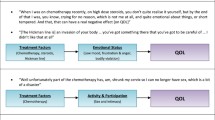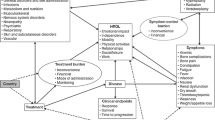Abstract
Purpose
It is recommended that patients with multiple myeloma should be assessed for unmet holistic needs at key times in their disease trajectory. The aim of this exploratory study was to characterise the holistic needs of advanced, intensively treated multiple myeloma using a structured assessment tool.
Methods
Patients with multiple myeloma who had undergone a haematopoietic stem cell transplantation and subsequent treatment for at least one episode of progressive disease but were in stable plateau phase were included in the study. Patients’ holistic needs were assessed using the self-reporting tool, Sheffield Profile for Assessment and Referral for Care (SPARC).
Results
Thirty-two patients with a median age of 60 years at assessment and a median of 5.5 years from diagnosis were recruited. Using the SPARC, half of the patients reported tiredness as ‘quite a bit/very much,’ while one third complained that daytime somnolence and insomnia were ‘quite a bit/very much.’ Forty-four percent of patients reported pain. One third of patients were bothered and distressed by the side effects from their treatment and were worried about long-term effects of their treatment. Thirty-one percent of patients felt that the effect of their condition had an impact on their sexual life, and 40 % were worried about the effect that their illness was having on their family or other people.
Conclusion
This is the first study to use a self-reported holistic needs assessment tool in multiple myeloma. A multidimensional structured questionnaire like the SPARC could provide a useful first step in the effective delivery of supportive and palliative care for patients with multiple myeloma.
Similar content being viewed by others
References
NCSI (2012) Adult survivorship: from concept to innovation.
Aaronson NK, Ahmedzai S, Bergman B, Bullinger M, Cull A, Duez NJ, Filiberti A, Flechtner H, Fleishman SB, de Haes JC (1993) The European Organization for Research and Treatment of Cancer QLQ-C30: a quality-of-life instrument for use in international clinical trials in oncology. J Natl Cancer Inst 85:365–376
Ahmed N, Bestall JC, Payne SA, Noble B, Ahmedzai SH (2009) The use of cognitive interviewing methodology in the design and testing of a screening tool for supportive and palliative care needs. Support Care Cancer 17:665–673
Bahrami M, Arbon P (2012) How do nurses assess quality of life of cancer patients in oncology wards and palliative settings? Eur J Oncol Nurs: Off J Eur Oncol Nurs Soc 16:212–219
Bird JM, Owen RG, D’Sa S, Snowden JA, Pratt G, Ashcroft J, Yong K, Cook G, Feyler S, Davies F, Morgan G, Cavenagh J, Low E, Behrens J (2011) Guidelines for the diagnosis and management of multiple myeloma 2011. Br J Haematol 154:32–75
Boland E, Eiser C, Ezaydi Y, Greenfield DM, Ahmedzai SH, Snowden JA (2013) Living with advanced but stable multiple myeloma: a study of the symptom burden and cumulative effects of disease and intensive (hematopoietic stem cell transplant-based) treatment on health-related quality of life. J Pain Symptom Manag 46:671–680
Burton CR, Payne S, Addington-Hall J, Jones A (2010) The palliative care needs of acute stroke patients: a prospective study of hospital admissions. Age Ageing 39:554–559
Frodin U, Borjeson S, Lyth J, Lotfi K (2010) A prospective evaluation of patients’ health-related quality of life during auto-SCT: a 3-year follow-up. Bone Marrow Transplant 46(10):1345–1352. doi:10.1038/bmt.2010.304
Gardiner C, Gott M, Ingleton C, Seymour J, Cobb M, Noble B, Bennett M, Ryan T (2013) Extent of palliative care need in the acute hospital setting: a survey of two acute hospitals in the UK. Palliat Med 27:76–83
Ghazali N, Kanatas A, Langley DJ, Scott B, Lowe D, Rogers SN (2011) Treatment referral before and after the introduction of the Liverpool Patients Concerns Inventory (PCI) into routine head and neck oncology outpatient clinics. Support Care Cancer: Off J Multinatl Assoc Support Care Cancer 19:1879–1886
Hughes P, Ahmed N, Winslow M, Walters SJ, Collins K, Noble B (2013) Consumer views on a new holistic screening tool for supportive and palliative-care needs: Sheffield Profile for Assessment and Referral for Care (SPARC): a survey of self-help support groups in health care. Health Expect. doi:10.1111/hex.12058
Kumar SK, Rajkumar SV, Dispenzieri A, Lacy MQ, Hayman SR, Buadi FK, Zeldenrust SR, Dingli D, Russell SJ, Lust JA, Greipp PR, Kyle RA, Gertz MA (2008) Improved survival in multiple myeloma and the impact of novel therapies. Blood 111:2516–2520
Leppert W, Majkowicz M, Ahmedzai SH (2012) The adaptation of the Sheffield Profile for Assessment and Referral for Care (SPARC) to the Polish clinical setting for needs assessment of advanced cancer patients. J Pain Symptom Manag 44:916–922
Maguire P, Faulkner A, Booth K, Elliott C, Hillier V (1996) Helping cancer patients disclose their concerns. Eur J Cancer 32A:78–81
Molassiotis A, Wilson B, Blair S, Howe T, Cavet J (2011) Living with multiple myeloma: experiences of patients and their informal caregivers. Support Care Cancer 19:101–111
Molassiotis A, Wilson B, Blair S, Howe T, Cavet J (2011) Unmet supportive care needs, psychological well-being and quality of life in patients living with multiple myeloma and their partners. Psychooncology 20:88–97
Osborne TR, Ramsenthaler C, Siegert RJ, Edmonds PM, Schey SA, Higginson IJ (2012) What issues matter most to people with multiple myeloma and how well are we measuring them? A systematic review of quality of life tools. Eur J Haematol 89:437–457
Pulte D, Gondos A, Brenner H (2011) Improvement in survival of older adults with multiple myeloma: results of an updated period analysis of SEER data. Oncologist 16:1600–1603
Richardson A, Medina J, Brown V, Sitzia J (2007) Patients’ needs assessment in cancer care: a review of assessment tools. Support Care Cancer: Off J Multinatl Assoc Support Care Cancer 15:1125–1144
Rooney AG, Netten A, McNamara S, Erridge S, Peoples S, Whittle I, Hacking B, Grant R (2014) Assessment of a brain-tumour-specific Patient Concerns Inventory in the neuro-oncology clinic. Support Care Cancer: Off J Multinatl Assoc Support Care Cancer 22:1059–1069
Ryan T, Ingleton C, Gardiner C, Parker C, Gott M, Noble B (2013) Symptom burden, palliative care need and predictors of physical and psychological discomfort in two UK hospitals. BMC Palliat Care 12:11
Smith A, Howell D, Patmore R, Jack A, Roman E (2011) Incidence of haematological malignancy by sub-type: a report from the Haematological Malignancy Research Network. Br J Cancer 105:1684–1692
Snowden JA, Ahmedzai SH, Ashcroft J, D’Sa S, Littlewood T, Low E, Lucraft H, Maclean R, Feyler S, Pratt G, Bird JM (2011) Guidelines for supportive care in multiple myeloma 2011. Br J Haematol 154:76–103
Velikova G, Awad N, Coles-Gale R, Wright EP, Brown JM, Selby PJ (2008) The clinical value of quality of life assessment in oncology practice—a qualitative study of patient and physician views. Psychooncology 17:690–698
Watson EK, Rose PW, Loftus R, Devane C (2011) Cancer survivorship: the impact on primary care. Br J Gen Pract 61:e763–e765
Wilcock A, Crosby V, Freer S, Freemantle A, Caswell G, Seymour J (2013) Lung cancer diagnosed following emergency admission: a mixed methods study protocol to improve understanding of patients’ characteristics, needs experiences and outcomes. BMC Palliat Care 12:24
Wilcock A, Klezlova R, Coombes S, Rawson A, Bentley R, Hooper D, Maddocks M (2010) Identifying supportive and palliative care needs in people with a recent diagnosis of thoracic cancer: acceptability of the SPARC questionnaire. Thorax 65:937–938
Acknowledgments
We thank the staff of the Clinical Research Facility for administration and nursing support for this study. A Richard Townley Research Grant from the Myeloma UK supported this study.
Conflict of interest
There are no conflicts of interest from any authors.
Author information
Authors and Affiliations
Corresponding author
Rights and permissions
About this article
Cite this article
Boland, E.G., Boland, J.W., Ezaydi, Y. et al. Holistic needs assessment in advanced, intensively treated multiple myeloma patients. Support Care Cancer 22, 2615–2620 (2014). https://doi.org/10.1007/s00520-014-2231-2
Received:
Accepted:
Published:
Issue Date:
DOI: https://doi.org/10.1007/s00520-014-2231-2




